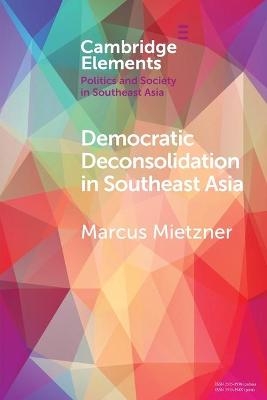
Democratic Deconsolidation in Southeast Asia
Seiten
2021
Cambridge University Press (Verlag)
978-1-108-46895-4 (ISBN)
Cambridge University Press (Verlag)
978-1-108-46895-4 (ISBN)
In 2016, Freedom House recorded the eleventh consecutive year of declining democratic freedoms, adding material to the growing political science literature on a global democratic recession. This Element explains the failure of democratization efforts in Southeast Asia, and why have autocracies proved so resistant to democratic opening?
Since the mid-2000s, the quality of democracy around the world has been in decline, and Southeast Asia is no exception. This Element analyzes the extent, patterns and drivers of democratic deconsolidation in the three Southeast Asian countries that boast the longest history of electoral democracy in the region: Indonesia, the Philippines and Thailand. While the exact deconsolidation outcomes differ, all three nations have witnessed similar trends of democratic erosion. In each case, long-standing democratic deficiencies (such as clientelism, politicized security forces and non-democratic enclaves) have persisted; rising wealth inequality has triggered political oligarchization and subsequent populist responses embedded in identity politics; and ambitious middle classes have opted for non-democratic alternatives to safeguard their material advancement. As a result, all three polities have descended from their democratic peaks between the late 1980s and early 2000s, with few signs pointing to a return to previous democratization paths.
Since the mid-2000s, the quality of democracy around the world has been in decline, and Southeast Asia is no exception. This Element analyzes the extent, patterns and drivers of democratic deconsolidation in the three Southeast Asian countries that boast the longest history of electoral democracy in the region: Indonesia, the Philippines and Thailand. While the exact deconsolidation outcomes differ, all three nations have witnessed similar trends of democratic erosion. In each case, long-standing democratic deficiencies (such as clientelism, politicized security forces and non-democratic enclaves) have persisted; rising wealth inequality has triggered political oligarchization and subsequent populist responses embedded in identity politics; and ambitious middle classes have opted for non-democratic alternatives to safeguard their material advancement. As a result, all three polities have descended from their democratic peaks between the late 1980s and early 2000s, with few signs pointing to a return to previous democratization paths.
1. Introduction; 2. Democratic Peaks 3. Democratic Descent; 4. Old Structures and Players; 5. Inequalities and their Politicization; 6. Democracy and the Middle Class; 7. Conclusion; 8. Bibliography.
| Erscheinungsdatum | 02.08.2021 |
|---|---|
| Reihe/Serie | Elements in Politics and Society in Southeast Asia |
| Zusatzinfo | Worked examples or Exercises |
| Verlagsort | Cambridge |
| Sprache | englisch |
| Maße | 150 x 230 mm |
| Gewicht | 140 g |
| Themenwelt | Sozialwissenschaften ► Politik / Verwaltung ► Politische Systeme |
| Sozialwissenschaften ► Politik / Verwaltung ► Staat / Verwaltung | |
| ISBN-10 | 1-108-46895-0 / 1108468950 |
| ISBN-13 | 978-1-108-46895-4 / 9781108468954 |
| Zustand | Neuware |
| Haben Sie eine Frage zum Produkt? |
Mehr entdecken
aus dem Bereich
aus dem Bereich
über Alltagsorte des sozialen Zusammenhalts
Buch | Softcover (2024)
transcript (Verlag)
CHF 33,55


